NRA endorses Gov. Kay Ivey in governor’s race
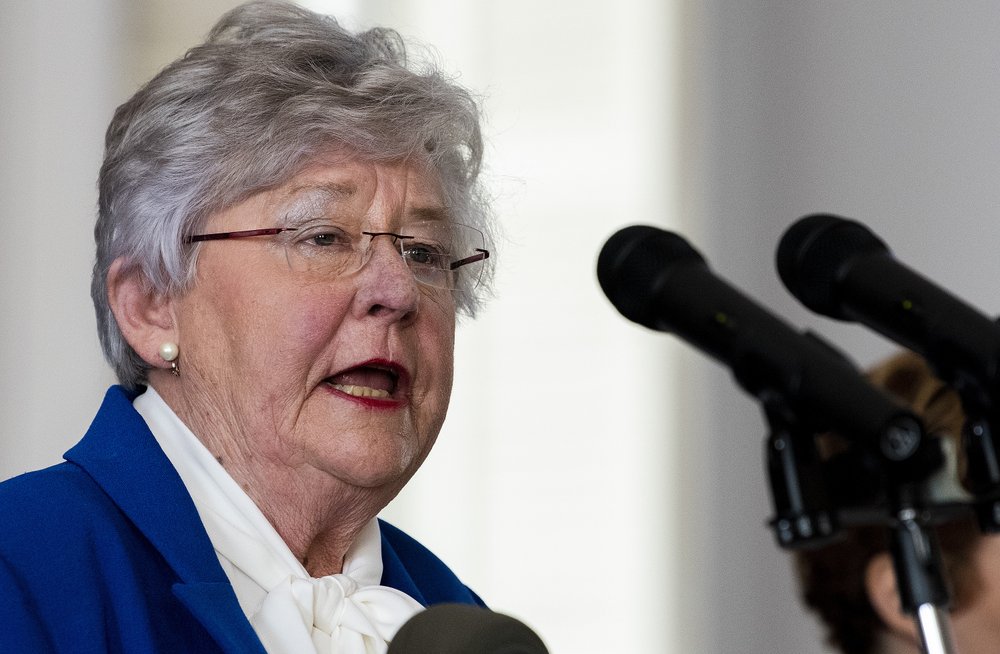
The National Rifle Association on Monday endorsed Alabama Gov. Kay Ivey in her bid to win a second full term in office. Ivey, in March, signed legislation abolishing the current state requirement to get a permit to carry a concealed handgun in public. The new law takes effect on January 1. In a brief campaign event announcing the endorsement, Ivey said people in Alabama will stand up for their constitutional rights, including the Second Amendment right to keep and bear arms. “We demand them, and no one will ever take them away from us. I know they won’t be taking my Smith & Wesson from me either,” Ivey said. Ivey faces several challengers in next month’s primary, including Lindy Blanchard, who was former President Donald Trump’s ambassador to Slovenia, and Tim James, the son of former Gov. Fob James. The NRA has regularly endorsed sitting governors in Alabama, where there has been no serious endeavor to pursue new gun control measures. Alabama in 2020 had the nation’s fifth-highest rate of gun-related deaths – including suicides and murders — with 1,141 deaths, according to numbers from the Centers for Disease Control and Prevention. Republished with the permission of the Associated Press.
Lawmakers advance bill on permitless carry
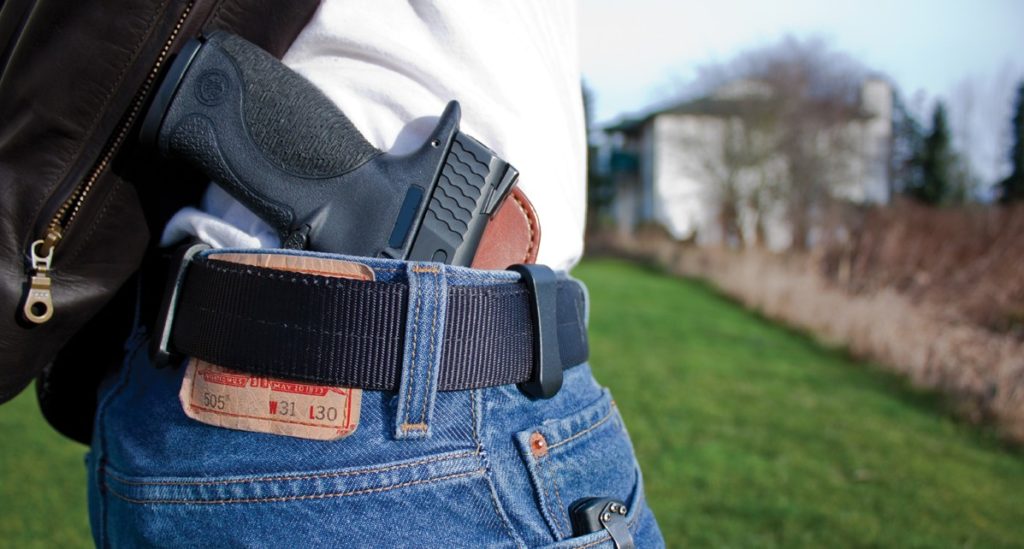
Alabama lawmakers on Wednesday advanced legislation to end the requirement to get a permit to carry a concealed handgun in public. The Senate Judiciary Committee voted 6-4 for the legislation. The bill now moves to the full Alabama Senate. House Republicans have named the bill a priority for the year, but the committee approval came over the objections of law enforcement officials who spoke against it. The legislation, sponsored by Republican Sen. Gerald Allen of Tuscaloosa, would end the requirement to obtain a permit to carry a concealed handgun although people could still get one if they choose. Rep. Shane Stringer, a Republican from Citronelle, has filed similar legislation in the House of Representatives. The proposal, as it has in past years, drew opposition from law enforcement officers during a public hearing Wednesday. Lee County Sheriff Jay Jones told the committee that the bill would take away a valuable tool for law enforcement officers to remove stolen weapons from the streets and to solve and prevent crimes. Edward Delmore, the chief of police for the Gulf Shores Police Department, said officers can now ask a person if they have a permit when they encounter a gun. Delmore said Oklahoma City bomber Timothy McVeigh was initially arrested for carrying a concealed weapon without a permit after a trooper noticed the gun during a traffic stop. “If you pass this, that arrest would not have happened in the same situation here,” he said. Representatives from gun rights groups, including the National Rifle Association, urged lawmakers to advance the bill, arguing that 21 states allow concealed carry without a permit. They argued Alabama already allows open carry— meaning that a person can legally carry a non-concealed handgun — and that it doesn’t make sense to require a permit if the person puts on a jacket or gets in a car. “As an elected official who swore to uphold the constitutions of this state and country, I will always do everything in my power to preserve the rights of Alabamians, especially those granted by the Second Amendment,” Allen said in a statement, commenting on committee passage. Democrats on the committee voted against the legislation. “A life is a way more important than the inconvenience of somebody having to get a permit to carry a gun,” Democratic Sen. Rodger Smitherman of Birmingham said. The bill has been introduced for several years without success, but House Republicans have named the bill a priority for the year. Republished with the permission of the Associated Press.
NRA fleeing New York for Texas using voluntary bankruptcy to restructure
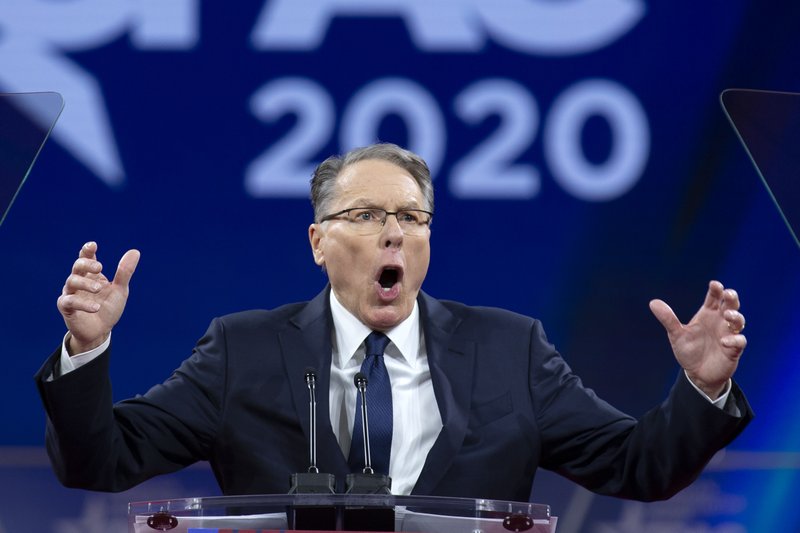
The National Rifle Association announced Friday it has filed for bankruptcy protection and will seek to incorporate the nation’s most politically influential gun-rights group in Texas instead of New York. The announcement made on the NRA’s website comes months after New York’s attorney general sued the organization over claims that top executives illegally diverted tens of millions of dollars for lavish personal trips, no-show contracts for associates, and other questionable expenditures. The coronavirus pandemic has also upended the NRA, which last year laid off dozens of employees, canceled its national convention, and scuttled fundraising. The NRA’s bankruptcy filing listed between $100 million and $500 million in assets and between $100 million and $500 million in liabilities. Still, the NRA claimed in announcing the move that the organization was “in its strongest financial condition in years.” The NRA filed for Chapter 11 bankruptcy in federal court in Dallas and said it planned to incorporate in Texas, where records show it formed a limited liability corporation, Sea Girt LLC, in November 2020. Sea Girt LLC made a separate bankruptcy filing Friday, listing fewer than $100,000 in liabilities. “The move will enable long-term, sustainable growth and ensure the NRA’s continued success as the nation’s leading advocate for constitutional freedom – free from the toxic political environment of New York,” the NRA said in a statement. A message seeking comment was left with a Dallas lawyer who made the bankruptcy filings on behalf of the NRA and Sea Girt LLC. Shortly after the announcement, New York Attorney General Letitia James said she would not allow the NRA to “evade accountability” or oversight. Her office’s lawsuit last year highlighted misspending and self-dealing claims that have roiled the NRA and its longtime leader, Wayne LaPierre, in recent years — from hair and makeup for his wife to a $17 million post-employment contract for himself. “The NRA’s claimed financial status has finally met its moral status: bankrupt,” James said. The gun-rights group boasts about 5 million members. Though headquartered in Virginia, the NRA was chartered as a nonprofit in New York in 1871 and is incorporated in the state. Going forward, the NRA said a committee will study opportunities to relocate segments of its operations to Texas and elsewhere. The NRA’s largest creditor, owed $1.2 million, is Ackerman McQueen, which is the group’s former advertising agency that was behind the now-shuttered NRA TV service. The NRA sued the Oklahoma-based company in 2019, alleging it was being overbilled, and said in Friday’s bankruptcy filing that the debt it is owed is disputed. The lawsuit is pending. A message seeking comment was left with Ackerman McQueen. In the New York lawsuit, Ackerman McQueen was accused of aiding lavish spending by LaPierre and other NRA executives by picking up the tab and then sending a lump sum bill to the organization for “out-of-pocket expenses.” Court records also show more than $960,000 owed to Membership Marketing Partners LLC, a firm that lists its headquarters at the same address as the NRA. Another $200,000 is owed to Speedway Motorsports, the North Carolina-based company that owns and operates NASCAR tracks, according to the records. Republican Texas Gov. Greg Abbott quickly welcomed the news, tweeting: “Welcome to Texas — a state that safeguards the 2nd Amendment.” The NRA said it has more than 400,000 members in Texas and plans to hold its annual convention in Houston later this year. Republished with the permission of the Associated Press.
National Rifle Association PVF announces federal scores and endorsements

As first reported by Yellowhammer news, the NRA-ILA has released its endorsements for candidates running for U.S. Senate and House of Representatives. According to Yellowhammer news, only the Seventh Congressional District, the race only features U.S. Rep. Terri Sewell, did not see the NRA Political Victory Fund make an endorsement. Sewell received an “F” grade. In Alabama’s First Congressional District, Jerry Carl received an “AQ” grade, the highest possible endorsement while Carl’s opponent James Averhart, who received an “F” grade. According to the NRA-PVF, a candidate with an “AQ” grade is described as, “A pro-gun candidate whose rating is based solely on the candidate’s responses to the NRA-PVF Candidate Questionnaire and who does not have a voting record on Second Amendment issues.” In the Second Congressional District, the NRA-PVF gave Barry Moore with an “A” grade while Democratic nominee Phyllis Harvey-Hall received an “F” grade. Incumbent congressmen who also received “A” ratings were U.S. Reps. Mike Rogers (AL-03), Robert Aderholt (AL-04), Mo Brooks (AL-05), and Gary Palmer (AL-06). In Alabama’s Senate race Yellowhammer News reported the NRA has endorsed Republican nominee Tommy Tuberville over U.S. Senator Doug Jones. Tuberville received an “AQ” grade, and Jones received a “D” grade. A “D” grade means the candidate is, “An anti-gun candidate who usually supports restrictive gun control legislation and opposes pro-gun reforms. Regardless of public statements, can usually be counted on to vote wrong on key issues.” “Too many members of the U.S. Congress believe that the Second Amendment is merely a suggestion and not a hard-earned constitutional right. Whether it is for hunting, sport shooting, home defense, or simply because they want one, every law-abiding U.S. citizen has the right to own a gun, and I will go toe-to-toe with any lawmaker who tries to take away that freedom,” Tuberville commented.
Supreme Court takes up gun case, though disputed law has changed
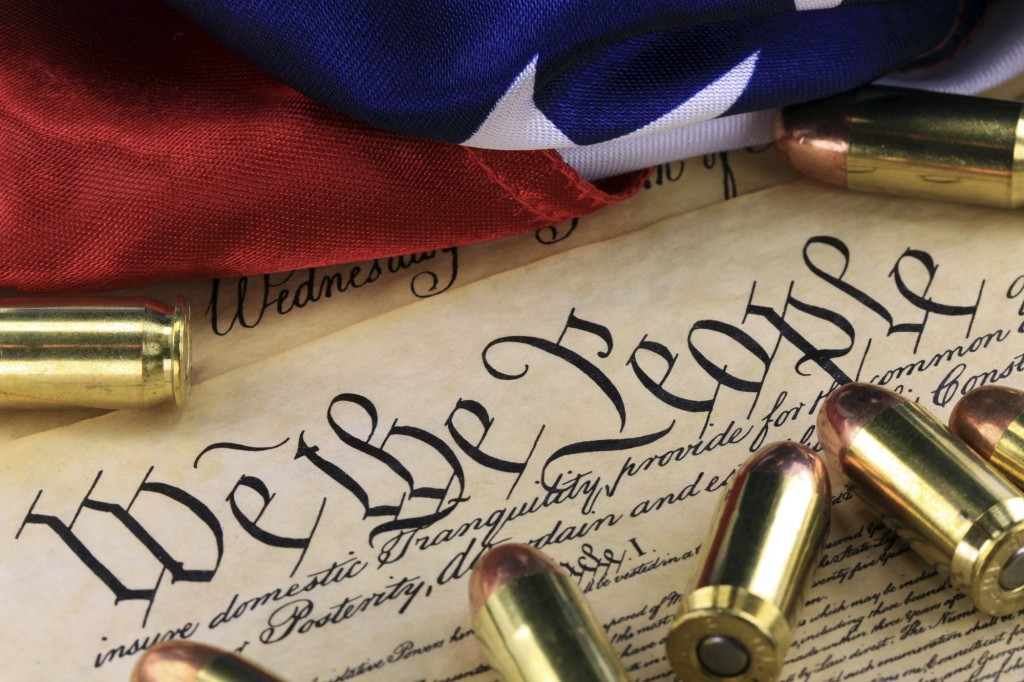
The Supreme Court is turning to gun rights for the first time in nearly a decade, even though those who brought the case, New York City gun owners, already have won changes to the regulation they challenged. The justices’ persistence in hearing arguments Monday despite the city’s action has made gun control advocates fearful that the court’s conservative majority could use the case to call into question gun restrictions across the country. Gun rights groups are hoping the high court is on the verge of extending its landmark rulings from 2008 and 2010 that enshrined the right to have a gun for self-defense at home. For years, the National Rifle Association and its allies had tried to get the court to say more about gun rights, even as mass shootings may have caused the justices to shy away from taking on new disputes over gun limits. Justice Clarence Thomas has been among members of the court who have complained that lower courts are treating the Second Amendment’s right to “keep and bear arms” as a second-class right. The lawsuit in New York began as a challenge to the city’s prohibition on carrying a licensed, locked and unloaded handgun outside the city limits, either to a shooting range or a second home. Lower courts upheld the regulation, but the Supreme Court’s decision in January to step into the case signaled a revived interest in gun rights from a court with two new justices, Neil Gorsuch and Brett Kavanaugh, both appointees of President Donald Trump. Officials at both the city and state level scrambled to find a way to remove the case from the justices’ grasp. Not only did the city change its regulation to allow licensed gun owners to transport their weapons to locations outside New York’s five boroughs, but the state enacted a law barring cities from imposing the challenged restrictions. “There is no case or controversy because New York City has repealed the ordinance and the New York state Legislature has acted to make sure it remains repealed,” said Jonathan Lowy, chief counsel and vice president of the gun control group Brady’s legal action project. But those moves failed to get the court to dismiss the case, although the justices are likely to ask at arguments about whether there’s anything left for them to decide. Paul Clement, who represents three New York residents and New York’s National Rifle Association affiliate challenging the transportation ban, said in an email that among the reasons the case remains alive legally is that the court frowns on tactical moves of the sort employed by the city and state that are meant to frustrate the justices’ review of an issue. In addition, he wrote, that “the City still views firearm ownership as a privilege and not a fundamental right and is still in the business of limiting transport and denying licenses for a host of discretionary reasons.” In the event the court reaches the substance of the law, the city does contend that what it calls its “former rule” did not violate the Constitution. But that would seem to be a tough sell given the court’s makeup, with Gorsuch and, in particular, Kavanaugh on the court. Kavanaugh voted in dissent when his federal appeals court upheld the District of Columbia’s ban on semi-automatic rifles. “Gun bans and gun regulations that are not longstanding or sufficiently rooted in text, history, and tradition are not consistent with the Second Amendment individual right,” Kavanaugh wrote in 2011. Gun control advocates worry that the court could adopt Kavanaugh’s legal rationale, potentially putting at risk regulations about who can carry guns in public, limits on large-capacity ammunition magazines and perhaps even restrictions on gun ownership by convicted criminals, including people convicted of domestic violence. “This approach to the Second Amendment would treat gun rights as an absolute right, frozen in history, and not subject to any restrictions as public safety demands,” said Hannah Shearer, litigation director at the Giffords Law Center to Prevent Gun Violence. Reflecting the possible high stakes, more than three dozen supporting legal briefs have been filed. The Trump administration, 25 mainly Republican states and 120 members of the House of Representatives are on the side of the gun owners. A dozen Democratic-led states and 139 House lawmakers back the city. In addition, Sen. Sheldon Whitehouse, Democrat-Rhode Island, a vocal court critic, filed a brief joined by four Senate Democratic colleagues that asked the justices to dismiss the case and resist being drawn into what he called a political project. Whitehouse also included a warning to the justices. “The Supreme Court is not well. And the people know it. Perhaps the Court can heal itself before the public demands it be ‘restructured in order to reduce the influence of politics,’” he wrote, quoting a public opinion poll showing support for such changes. All 53 Republican senators responded with a letter urging the court not to be cowed by the Democrats’ threats. A decision is expected by late June. By Mark Sherman Associated Press. Republished with the Permission of the Associated Press.
Supreme Court lets Sandy Hook shooting lawsuit go forward

The Supreme Court said Tuesday a survivor and relatives of victims of the Sandy Hook Elementary School shooting can pursue their lawsuit against the maker of the rifle used to kill 26 people. The justices rejected an appeal from Remington Arms that argued it should be shielded by a 2005 federal law preventing most lawsuits against firearms manufacturers when their products are used in crimes. The court’s order allows the lawsuit filed in Connecticut state court by a survivor and relatives of nine victims who died at the Newtown, Connecticut, school on Dec. 14, 2012 to go forward. The lawsuit says the Madison, North Carolina-based company should never have sold a weapon as dangerous as the Bushmaster AR-15-style rifle to the public. Gunman Adam Lanza used it to kill 20 first graders and six educators. It also alleges Remington targeted younger, at-risk males in marketing and product placement in violent video games. Lanza was 20 years old. Lanza earlier shot his mother to death at their Newtown home and killed himself as police arrived at the school. The rifle was legally owned by his mother. The Connecticut Supreme Court had earlier ruled 4-3 that the lawsuit could proceed for now, citing an exemption in the federal law. The decision overturned a ruling by a trial court judge who dismissed the lawsuit based on the 2005 federal law, named the Protection of Lawful Commerce in Arms Act. The federal law has been criticized by gun control advocates as being too favorable to gun-makers, and it has been used to bar lawsuits over other mass killings. The case is being watched by gun control advocates, gun rights supporters and gun manufacturers across the country, as it has the potential to provide a roadmap for victims of other mass shootings to circumvent the federal law and sue the makers of firearm. The 2005 federal law has been cited by other courts that rejected lawsuits against gun-makers and dealers in other high-profile shooting attacks, including the 2012 Colorado movie theater shooting and the Washington, D.C., sniper shootings in 2002. The National Rifle Association, 10 mainly Republican-led states and 22 Republicans in Congress were among those urging the court to jump into the case and end the lawsuit against Remington. By Mark Sherman Associated Press. Republished with the permission of the Associated Press.
Walmart introduces new gun restrictions but will they help?

Walmart has won praise from gun control advocates for its decision to discontinue sales of certain gun ammunition and request that customers no longer openly carry firearms in its stores. But whether the moves will translate into fewer guns on the street remains an open question. The announcement Tuesday follows similar steps by other retailers responding to public pressure to restrict gun and ammunition sales. In March, Dick’s Sporting Goods said it would stop selling firearms and ammunition at 125 of its 700-plus locations. Meanwhile, Starbucks, Target, Wendy’s and most recently Kroger have also asked customers not to openly carry guns when visiting their stores. Supporters of stricter gun laws say that as the nation’s largest retailer, Walmart will have outsized influence on the gun debate, sending a strong message to Congress as well as other corporations to also take action. “Walmart deserves enormous credit for joining the strong and growing majority of Americans who know that we have too many guns in our country and they are too easy to get,” said Igor Volsky, executive director and founder of Guns Down America, in a statement. “That work doesn’t end with Walmart’s decision today. As Congress comes back to consider gun violence, Walmart should make it clear that it stands with Americans who are demanding real change.” Still, most firearms sales come from thousands of unaffiliated gun shops or gun shows, not big retail chains, so it’s not clear how much difference Walmart’s moves will make. About half of its more than 4,750 U.S. stores sell firearms, or only around 2 percent of all U.S. firearms. The Bentonville, Arkansas-based discounter said Tuesday it will stop selling handgun ammunition as well as short-barrel rifle ammunition, such as the .223 caliber and 5.56 caliber used in military style weapons, after it runs out of its current inventory. That in turn will reduce Walmart’s market share of ammunition from around 20 percent to a range of about 6 percent to 9 percent, according to a memo by the company CEO Doug McMillon. Walmart will also discontinue handgun sales in Alaska. Walmart stopped selling handguns in the mid-1990s in every state but Alaska. The latest move marks its complete exit from that business and allows it to focus on hunting rifles and related ammunition only. The retailer is further requesting that customers refrain from openly carrying firearms at its Walmart and Sam’s Club stores unless they are law enforcement officers. However, it said that it won’t be changing its policy for customers who have permits for concealed carry. Walmart says it will be adding signage in stores to inform customers of those changes.Walmart’s announcement comes just days after a mass shooting claimed seven lives in Odessa, Texas and follows two other back-to-back shootings last month, one of them at a Walmart store. Last month, a gunman entered a Walmart in El Paso, Texas, and killed 22 people with an AK-style firearm that the retailer already bans the sale of, marking the deadliest shooting in Walmart’s history. A second unrelated shooting that same day in Dayton, Ohio killed nine people . A few days before that, two Walmart workers were killed by another worker at a store in Southaven, Mississippi. “In a complex situation lacking a simple solution, we are trying to take constructive steps to reduce the risk that events like these will happen again,” according to McMillon’s memo. “The status quo is unacceptable.” The National Rifle Association posted a tweet attacking Walmart’s announcement Tuesday. “It is shameful to see Walmart succumb to the pressure of the anti-gun elites. Lines at Walmart will soon be replaced by lines at other retailers who are more supportive of America’s fundamental freedoms,” it said. Walmart took an initial step of ordering workers in stores nationwide to remove video game signs and displays that depict violence as a way to be more sensitive to customers in the aftermath of the El Paso shooting. Still, that fell well short of demands for the retailer to stop selling firearms entirely. Critics have also wanted Walmart to stop supporting politicians backed by the NRA. The retailer has long found itself in an awkward spot with its customers and gun enthusiasts. Many of its stores are located in rural areas where hunters depend on Walmart to get their equipment. Walmart is trying to walk a fine line by trying to embrace its hunting heritage while being a more responsible retailer. With its new policy on “open carry,” McMillon noted in his memo that individuals have tried to make a statement by carrying weapons into its stores just to frighten workers and customers. But there are well-intentioned customers acting lawfully who have also inadvertently caused a store to be evacuated and local law enforcement to be called to respond. Like other companies, Walmart is not enforcing an outright ban because they don’t want to put their employees in confrontational situations. Walmart says it hopes to help other retailers by sharing its best practices in background checks. And the company, which in 2015 stopped selling assault rifles like the AR-rifles used in several mass shootings, urged more debate on the reauthorization of the assault weapons ban while also calling for the government to strengthen background checks. Walmart sent letters Tuesday to the White House and the Congressional leadership seeking action on these “common sense” measures. Over the last 15 years, Walmart had expanded beyond its hunting and fishing roots, carrying items like assault rifles in response to increasing demand. But particularly since 2015, often coinciding with major public mass shootings, the company has made moves to curb the sale of ammunition and guns. Walmart announced in February 2018 that it would no longer sell firearms and ammunition to people younger than 21 and also removed items resembling assault-style rifles from its website. Those moves were prompted by the mass shooting at a high school in Parkland, Florida, that killed 17 people. In 2015, Walmart stopped selling semi-automatic weapons like the AR-15 style rifle,
High-capacity magazines get new scrutiny as congress returns
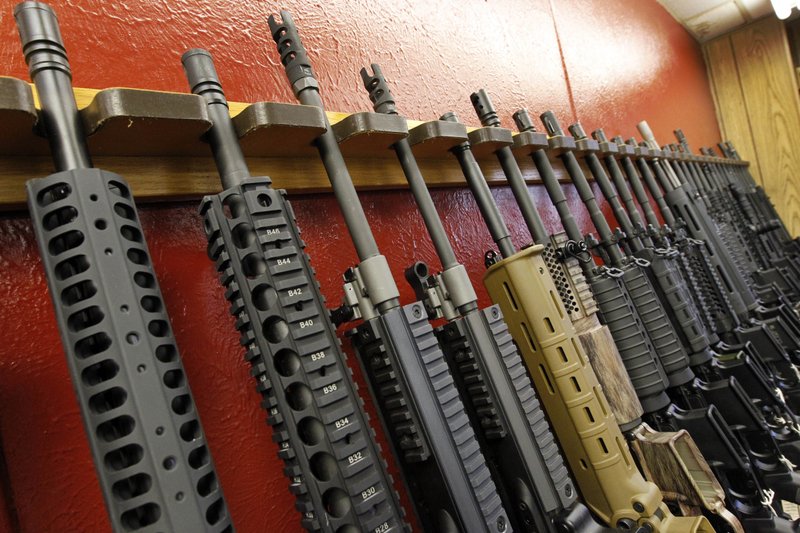
Lawmakers around the country are making a renewed push to ban high-capacity magazines that gunmen have used in many recent massacres, allowing them to inflict mass casualties at a startling rate before police can stop the carnage. Nine states have passed laws restricting magazine capacity to 10 to 15 bullets, and the Democratic-led U.S. House plans to consider a similar ban at the federal level in the coming weeks. In arguing for the bans, politicians, experts and gun-control advocates point out that in the time it takes for a driver to wait through a stop light, a shooter with a 100-round magazine can kill and injure dozens of people. The man who opened fire in Dayton, Ohio, last month killed nine people and injured 27 others in only 30 seconds, in part because of the 100-bullet drum attached to his rifle. It only took 85 seconds for a gunman to empty several 30-round magazines at an IHOP in Carson City, Nevada, killing four people and injuring 14 in 2011. Authorities have not released any information on the accessories the gunman in Odessa, Texas, used over the weekend when he opened fire on police and bystanders with an AR-style weapon. The deadliest example occurred in Las Vegas two years ago when a gunman possessed a dozen 100-round magazines that helped him squeeze off 10 rounds per second onto a crowd of concert-goers from his hotel room, killing 58 people. Las Vegas gunman Stephen Paddock had an arsenal of high-powered rifles along with his large-capacity magazines and bump stocks — now-banned devices that attach to a gun to make it fire bullets more rapidly. The Trump administration banned bump stocks after that massacre, but the high-capacity magazines that smoothly fed hundreds of bullets into Paddock’s rifles remain legal. “We know from video evidence that he was firing about 10 rounds per second,” said Louis Klarevas, a research professor at Teachers College, Columbia University. “The reason he was able to do that was he had a combination of assault rifles with bump stocks and large-capacity magazines. Imagine if he only had 10-round magazines. He would only have shot 10 rounds at a time.” The Keep Americans Safe Act will soon be debated in the House Judiciary Committee. It would prohibit the transfer, importation or possession of magazines that hold more than 10 rounds of ammunition. The bill is co-sponsored by three Democratic members of Congress whose states suffered mass shooting involving these magazines: Ted Deutch of Florida, Diana DeGette of Colorado and Dina Titus of Nevada. “There is only one purpose for a high-capacity magazine: to maximize human casualties and allow gunmen to fire more rounds of ammunition at a time without reloading,” Deutch said in a statement. “But those precious seconds it takes to reload can mean saving countless lives.” Firearm magazines are not regulated by federal law, but some states have set limits on their sizes. They include California, Colorado, Connecticut, Hawaii, Maryland, Massachusetts, New Jersey, New York, Vermont and Washington D.C. More Republicans are warming up to the idea as well. Rep. Mike Turner of Ohio called for legislation after the Dayton killings that would put a limit on magazine sizes, as well as a ban on the sale of military-style weapons. But federal legislation is expected to face deep resistance in the Republican-led Senate and from the National Rifle Association. Critics point out that there are millions of high-capacity magazines in circulation, limiting the effectiveness of a ban. Alan Gottlieb, with the Bellevue, Washington-based Second Amendment Foundation, said large-capacity magazines are important for self-defense and can help when there are multiple attackers in a home. “Plus, it only takes one second to switch out one magazine for another,” he said. “There are lots of videos on how easy it is to do that.” The advocacy group Everytown For Gun Safety’s study of mass shootings between 2009 and 2017 found that 58 percent involved firearms with high-capacity magazines. The study looked at shootings where the magazine capacity was known and where at least four people were killed, not including the shooter. The cases included the Aurora, Colorado, movie theater killings in which the gunman used a 100-round magazine drum, killing 12 and injuring 70. The gunman who killed 77 people at a youth camp and in Oslo, Norway, in 2011 purchased his 30-round magazines from the U.S., according to his manifesto. The 19-year-old man who killed 17 students and staff at Marjory Stoneman Douglas High School last year also carried high-capacity magazines, according to the official Public Safety Commission report released in January that said police recovered eight 30- and 40-round magazines from the scene. The advocacy group Sandy Hook Promise has been running a promotion on Twitter asking people to sign a petition in support of the passage of the Keep Americans Safe Act, the measure being debated Wednesday. The tweets say the man who killed dozens at Sandy Hook Elementary School in 2012 used a 30-round magazine and 11 children were able to escape when he stopped to reload. The military-style firearms used in many mass shootings in the U.S. can be fired rapidly, but “the limitation to the carnage is the capacity of the magazine,” said David Chipman, a former agent with the Bureau of Alcohol, Tobacco, Firearms and Explosives who works as a policy adviser at Giffords: Courage to Fight Gun Violence. Others have argued that if the shooter only has smaller-sized magazines, they’ll just carry more guns or extra magazines. Dr. Michael Siegel, a researcher at Boston University, conducted a study on high-capacity magazines in 2017 that found that states that limit magazine size have fewer mass shootings. “The only thing that limits the number of causalities is the number of rounds that are in the gun, because the only thing that stops the shooter is having to reload,” Siegel said. “Even though it might only take a few seconds to reload, it provides a few moments for people to flee or for an
Donald Trump says he’ll work with congress to stop mass shootings
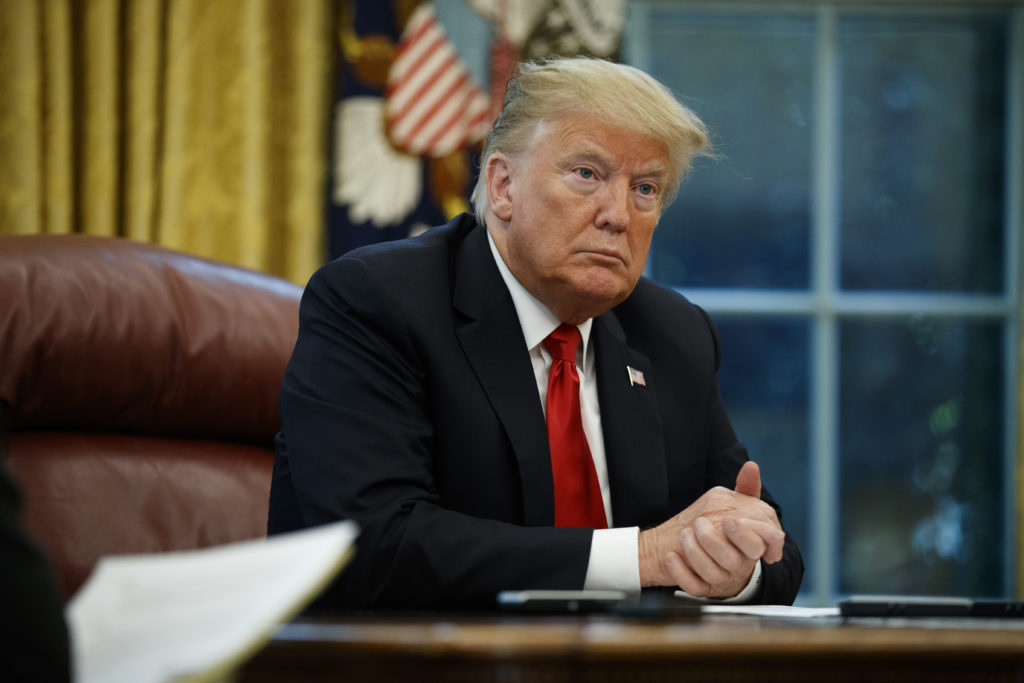
President Donald Trump expressed a commitment Sunday, hours after the latest deadly mass shooting, to work with a divided Congress to “stop the menace of mass attacks.” He said any measures must satisfy the competing goals of protecting public safety and the constitutional right to gun ownership and seemed to cast fresh doubt on the merits of instituting more thorough background checks for gun purchases. Trump spoke shortly after the death toll in Saturday’s rampage in West Texas rose to seven as authorities worked to understand why a man pulled over for a traffic infraction opened fire on state troopers and fled. He shot more than 20 people before he was killed by police. A motive has not been released. The president said it would be “wonderful to say” he’d work to “eliminate” mass shootings, but acknowledged that that was unlikely. “We want to substantially reduce the violent crime,” Trump said at the top of a briefing about Hurricane Dorian at Federal Emergency Management Agency headquarters in Washington. Trump’s commitment to gun control has been in doubt ever since 17 students and adults were killed in a shooting at a Parkland, Florida, high school on Valentine’s Day in 2018. Trump came out in favor of stronger background checks after the shooting, but then quickly retreated under pressure from the National Rifle Association, the politically powerfully gun owners’ lobby that strongly backed his bid to become president. More recently, he has waffled on the merits of stronger background checks for gun purchases in the aftermath of back-to-back shootings in El Paso, Texas, and Dayton, Ohio, that killed more than 30 people about a month ago. Instead, Trump sought to elevate mental health issues over access to guns. “For the most part, sadly, if you look at the last four or five (shootings) going back even five or six or seven years, for the most part, as strong as you make your background checks, they would not have stopped any of it,” he said. “So it’s a big problem. It’s a mental problem. It’s a big problem.” Trump mentioned the need for “strong measures to keep weapons out of the hands of dangerous and deranged individuals” along with changes to a mental health system he described as “broken.” He also called for ensuring that criminals with guns “are put behind bars and kept off the streets.” “Public safety is our No. 1 priority, always wanting to protect our Second Amendment. So important,” he said, referring to the constitutional amendment that established the right to keep and bear arms. Trump told reporters earlier Sunday that he’s been speaking to lawmakers from both political parties and “people want to do something.” He said the administration is “looking at a lot of different things” and hopes to have a package ready by the time Congress returns to session next week. The Republican-controlled Senate has refused to take up several gun-control bills that passed the Democratic-controlled House this year, and the GOP historically has opposed many efforts to strengthen the nation’s gun laws. House Speaker Nancy Pelosi called on the Republican-controlled Senate to “end its obstruction” and send the gun violence measures to Trump. Republican Sen. Pat Toomey of Pennsylvania said he has discussed the issue with Trump and described the president as “very interested in doing something meaningful.” Toomey has long pushed a bipartisan bill with Democratic Sen. Joe Manchin of West Virginia to expand background checks and said he remains interested in measures to keep guns away from people who shouldn’t have them. “We’re going to take a very serious run at it,” he said. Others, like Republican Sen. Rick Scott of Florida, argued that Congress should use his state as a model. Scott, who was governor at the time of the Parkland school shooting, said officials sat down within days of the massacre with law enforcement, mental health counselors and educators. Legislation was quickly passed and signed into law, including a “red-flag” statute that would allow authorities to confiscate weapons from individuals deemed by the courts to be a threat to themselves or others. Scott said he doesn’t want to take guns away from law-abiding citizens, but added that “we’ve got to figure out how we get guns away from mentally ill people who want to harm others or themselves.” In the days immediately after the August shootings in Texas and Ohio, Trump said he was eager to implement “very meaningful background checks,” saying there was “tremendous support” for it. He also said he disagreed with the NRA’s stance that such legislation would open the door to infringing on Second Amendment rights. But the president has also acknowledged that his core supporters support gun rights, which highlights the challenge he has to balance the politics of gun control before he stands for reelection in November 2020. Toomey was interviewed on ABC’s “This Week,” and Scott spoke on NBC’s “Meet the Press.” By Darlene Superville Associated Press Follow Darlene Superville on Twitter: https://www.twitter.com/dsupervilleap Republished with the permission of the Associated Press.
Mitch McConnell wants to consider gun background checks in fall
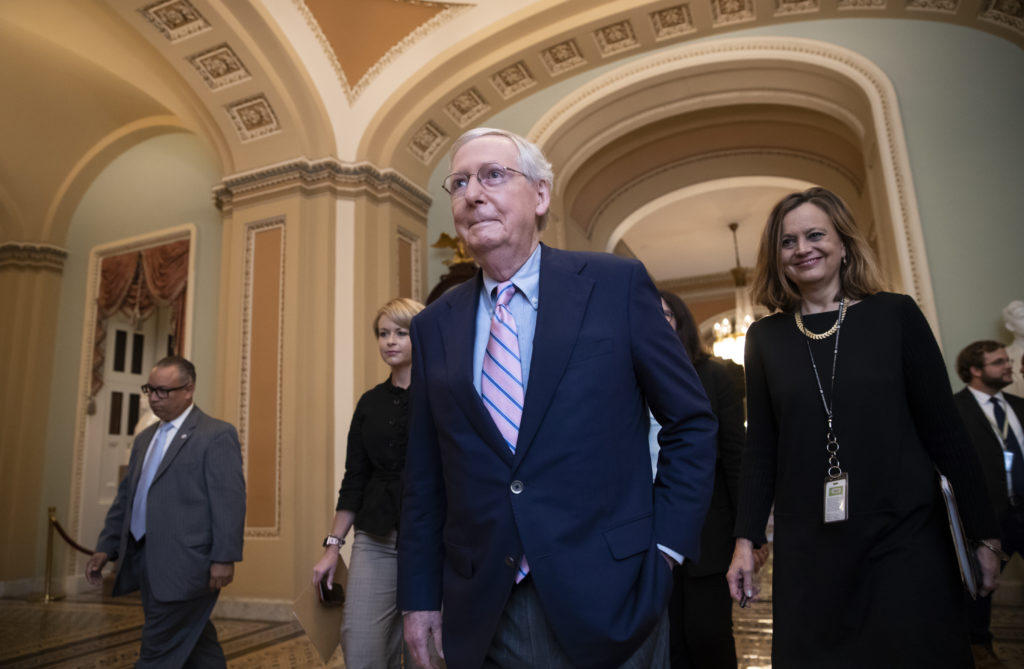
Shifting the gun violence debate, Senate Majority Leader Mitch McConnell says he now wants to consider background checks and other bills, setting up a potentially pivotal moment when lawmakers return in the fall. The Republican leader won’t be calling senators back to work early, as some are demanding. But he told a Kentucky radio station that President Donald Trump called him Thursday morning and they talked about several ideas. The president, he said, is “anxious to get an outcome, and so am I.” Stakes are high for all sides, but particularly for Trump and his party. Republicans have long opposed expanding background checks — a bill passed by the Democratic-led House is stalled in the Senate — but they face enormous pressure to do something after mass shootings in El Paso, Texas and Dayton, Ohio, that left 31 people dead. McConnell, who is facing protests outside his Louisville home, can shift attention back to Democrats by showing a willingness to engage ahead of the 2020 election. “What we can’t do is fail to pass something,” McConnell said. “What I want to see here is an outcome.” McConnell said he and Trump discussed various ideas on the call, including background checks and the so-called “red flag” laws that allow authorities to seize firearms from someone deemed a threat to themselves or others. “Background checks and red flags will probably lead the discussion,” McConnell told Louisville’s WHAS-AM. He noted “there’s a lot of support” publicly for background checks. “Those are two items that for sure will be front and center as we see what we can come together on and pass.” Trump has been interested in federal background checks before — and tweeted Monday about them — only to drop the issue later, a turnaround similar to his reversal on gun proposals after the 2018 high school shooting at Parkland, Florida. The powerful National Rifle Association and its allies on Capitol Hill have long wielded influence, but the gun lobby’s grip on Democrats started slipping some time ago, and it’s unclear how much sway the NRA and other gun groups still hold over Republicans in the Trump era. House Speaker Nancy Pelosi and Senate Democratic Leader Chuck Schumer said Trump assured them in phone calls Thursday he will review the House-passed bill that expands federal background checks for firearm sales. In a joint statement, they said Trump called them individually after Pelosi sent a letter asking the president to order the Senate back to Washington immediately to consider gun violence measures. Schumer and Pelosi said they told Trump the best way to address gun violence is for the Senate to take up and pass the House bill. Trump, they said, “understood our interest in moving as quickly as possible to help save lives.” The politics of gun control are shifting amid the frequency and toll of mass shootings. Spending to support candidates backing tougher gun control measures — mostly Democrats — surged in the 2018 midterms, even as campaign spending by the NRA declined. NRA chief Wayne LaPierre said in rare public statement Thursday that some federal gun control proposals “would make millions of law-abiding Americans less safe and less able to defend themselves and their loved ones.” The organization said proposals being discussed in Congress would not have prevented the mass shootings in Texas and Ohio that killed 31 people. McConnell has been under pressure from Democrats, and others, to bring senators back to Washington after the back-to-back weekend shootings. Earlier, more than 200 mayors, including those in Dayton and El Paso, urged the Senate to return to the Capitol. “Our nation can no longer wait,” they wrote. McConnell on Thursday rejected the idea of reconvening the Senate, saying calling senators back now would just lead to people “scoring points and nothing would happen.” Instead, the GOP leader wants to spend the August recess talking with Democratic and Republican senators to see what’s possible. Senators have been talking among themselves, and holding conference calls, to sort out strategy. “If we do it prematurely it’ll just be another frustrating position for all of us and for the public,” he said. The politics of gun violence are difficult for Republicans, including McConnell. He could risk losing support as he seeks reelection in Kentucky if he were to back restricting access to firearms and ammunition. Other Republicans, including those in Colorado, Maine and swing states, also would face difficult votes, despite the clamor for gun laws. GOP senators are also considering changes to the existing federal background check system, modeled on a law signed last year that improved the National Instant Criminal Background Check system, as well as increased penalties for hate crimes. While many of those proposals have bipartisan support, Democrats are unlikely to agree to them without consideration of the more substantive background checks bill. “We Democrats are not going to settle for half-measures so Republicans can feel better and try to push the issue of gun violence off to the side,” Schumer said Wednesday. Sen. Joe Manchin, a West Virginia Democrat who, along with Sen. Pat Toomey, Republican-Pennsylvania, is pushing a bill to expand background checks, said Trump’s support will be the determining factor in whatever gets done. “At this point in time leadership comes from President Trump,” Manchin said. By Lisa Mascaro and Matthew Daly Associated Press Associated Press writer Bruce Schreiner in Louisville, Kentucky, contributed to this report. Republished with permission of the Associated Press.
Supreme Court returns to gun rights for 1st time in 9 years
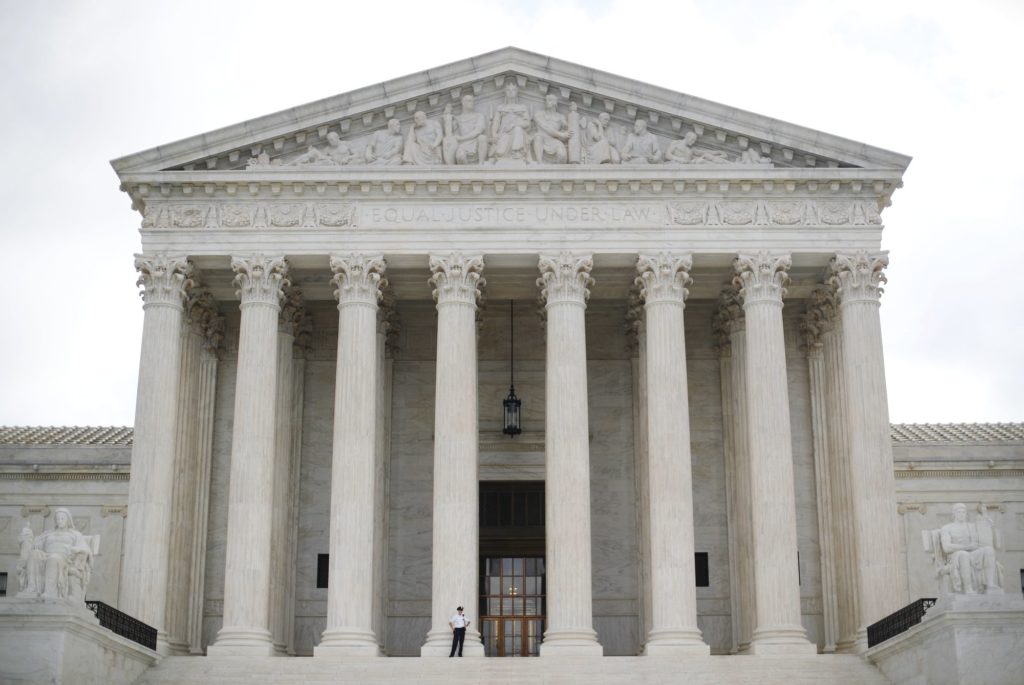
The Supreme Court said Tuesday it will take up its first gun rights case in nine years, a challenge to New York City’s prohibition on carrying a licensed, locked and unloaded handgun outside the city limits. The court’s decision to hear the appeal filed by three New York residents and New York’s National Rifle Association affiliate could signal a revived interest in gun rights by a more conservative court. The case won’t be argued until October. The challengers are represented by prominent lawyer Paul Clement, who has been urging the justices to elaborate on the extent of constitutional gun rights the Supreme Court declared in decisions in 2008 and 2010. The court had previously rejected several appeals. The court may be more willing to take on a gun rights case now that Justice Anthony Kennedy has retired and been replaced by Justice Brett Kavanaugh, who was President Donald Trump’s second high-court nominee to be confirmed. Clement says the case “is a perfect vehicle to reaffirm that those decisions and the constitutional text have consequences.” Joining in support of gun rights, 17 states said the court should break its years-long silence and use the case to define the scope of gun rights under the Constitution and the level of scrutiny, or skepticism, judges should apply to gun laws. New York’s ordinance allows people licensed to have handguns to carry them outside the home to gun ranges in the city. The guns must be locked and unloaded. The city residents who filed suit want to practice shooting at target ranges outside the city or take their guns to second homes elsewhere in New York state. Lower courts had rejected the challenge. The city’s top lawyer, Zachary Carter, urged the court to reject the case, arguing that the restrictions allowed New York police to reduce the number of guns carried in public. There are seven shooting ranges in the city and at least one in each of the city’s five boroughs, Carter said. Republished with permission from the Associated Press.
NRA endorses Wes Allen for Alabama State House District 89

The National Rifle Association (NRA) endorsed Wes Allen in his race for the Alabama House of Representatives in District 89, the group announced Monday. An endorsement from the NRA‘s Political Action Committee, the NRA Political Victory Fund (NRA-PVF), can be a game changer for many candidates. “When provided with the facts, the nation’s elected officials will recognize that “gun control” schemes are an infringement on the Second Amendment and a proven failure in fighting crime” says the fund. “The importance of this premise lies in the knowledge that, as one U.S. Congressman put it: ‘The gun lobby is people.’” The NRA-PVF makes its decisions based on voting records, public statements and their responses to their NRA-PVF questionnaire. “I am honored to be endorsed by the NRA,” Allen said. “This is a group of hardworking men and women who support the United States Constitution and the preservation of our rights as Americans. Their commitment to preserving gun rights for law abiding citizens is something that I appreciate.” Allen, the Republican nominee in the race, faces-off against Democrat Joel Lee Williams in the November 6 general election for the seat currently held by Troy-Republican Rep. Alan Boothe who announced he will not seek reelection. Allen, who has served as Pike County’s Probate Judge since a 2009 appointment from then-Gov. Bob Riley, is viewed as one of the most conservative Probate Judges in the Yellowhammer State. District 89 includes Pike County and the northern half of Dale County.

